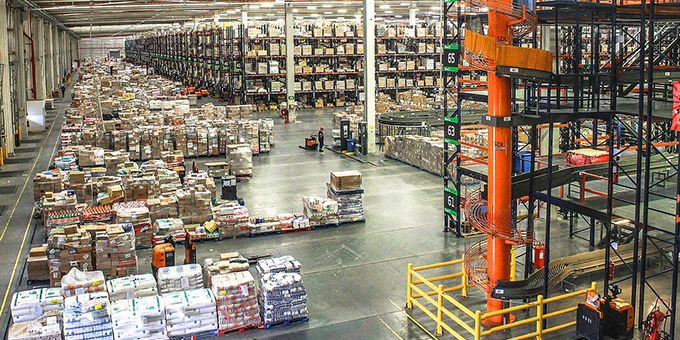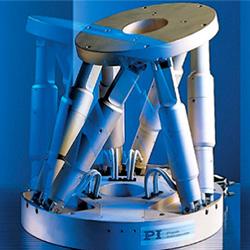If you’re in manufacturing, or if you oversee any part of a consumer goods or e-commerce supply chain, you know how many moving pieces there are in fulfillment.
 Should You Partner With a Fulfillment Service?
Should You Partner With a Fulfillment Service?

Caleb Danziger Tech Writer | The Byte Beat
If you’re in manufacturing, or if you oversee any part of a consumer goods or e-commerce supply chain, you know how many moving pieces there are in fulfillment. Dispatching customer orders in a timely fashion, 100 percent accurately, can feel like a completely separate discipline from why you got into the industry in the first place.
In fact, fulfillment is a separate discipline. Many companies like yours outsource all or part of the fulfillment process so that they can refocus on their core competencies.
Why would you want to trust another entity with this critical function? Are there times when it makes more sense to develop in-house fulfillment services and talent? Let’s take a look.
What Are Fulfillment Services?
Fulfillment services typically include one or all of the following functions:
-
Receiving and unloading products
-
Sorting, categorizing and warehousing
-
Picking, packing and shipping
-
Processing customer exchanges and returns
Many third-party fulfillment services are holistic, end-to-end solutions. In cases like these, your fulfillment partner will receive your products at their dock, store them in their warehouses, process and package your orders, ship items to customers, provide tracking and other information to the recipient and, as needed, process customer returns.
Other fulfillment services might include credit card processing, inventory management — including keeping customer-facing websites accurate — routine product reordering and more. Hundreds and potentially thousands of fulfillment companies are in operation today, many of which maintain a tight focus on e-commerce services.
What Are the Advantages of Outsourcing Fulfillment?
The question is when and whether manufacturers should seek out a partner to take over their fulfillment duties. If you ask 100 different entrepreneurs why they made this change, you’ll get 100 different answers. What these clients have in common is the realization that the time, expense and labor associated with order fulfillment takes away from what their business should be.
This growing pain is common for businesses on the rise. It’s part of why experts expect fulfillment services to grow four to six percent by 2021, at which point it’ll be a $55.6 billion global industry.
It’s clear that lots of companies have learned about the advantages of outsourced fulfillment and have weighed the benefits against their current expenses and workflows. The advantages of this service include:
-
Cost savings: Fulfillment services companies know how to do one thing as cost-effectively and efficiently as possible.
-
Time savings: Outsourcing fulfillment frees up your in-house talent to spend more time and energy on the company’s core functions and mission.
-
Precise and transparent order tracking: Fulfillment companies add value to your operation with detailed and accurate order monitoring features.
-
Streamlined order return process: Outside fulfillment services often include customer return processing, a vital part of the customer experience.
-
Unity for multiple sales channels: A properly equipped fulfillment services partner can bring order and unity to a growing, digital-savvy business.
-
Ongoing and accurate inventory counts: A good partner should be able to provide inventory numbers in real-time for your team and customers on your website.
Beyond the positives above, another worth mentioning is the chance to unlock intelligence reports you may not have been able to study before. Creating a data-centric fulfillment operation is an excellent way to improve the customer experience from top to bottom. It also yields insights that you can leverage to improve sales, such as patterns in buying behavior.
Should You Hire a Fulfillment Company?
Finding out whether you should partner with a fulfillment company involves asking the right questions and taking the following factors into account.
1. Do You Need Tighter Turnaround Times?
Delivering ever-faster turnaround times for customers is one of the most intense sources of competition among e-commerce and consumer goods companies today. Help from a dedicated third party could significantly cut down on fulfillment times and delivery windows and keep your clients satisfied enough to stick around.
2. Are You Prepared for Future Warehousing and Distribution Needs?
Are you running out of storage space for inventory? Do you need to hire more talent to manage your warehouse? Will the next expansion of your business involve new territories? You can gain access to ready-made infrastructure, like warehouses and the associated equipment, by partnering with strategically placed fulfillment companies instead of making investments in land and space yourself.
3. Do You Need to Save Money on Labor and Equipment?
Periodic upticks in sales, like around the holidays, can send manufacturers and distributors scrambling to hire seasonal workers and buy material handling equipment to meet demand. Partnering with a third-party fulfillment service helps insulate your company against these disruptions and demands.
4. Do You Want Access to the Latest Technologies?
Manufacturers and other companies that use in-house fulfillment teams may find themselves at the mercy of technology. It’s a pricy challenge to keep fulfillment and enterprise planning software updated with the latest features. Using fulfillment services is similar to buying a subscription to the latest enterprise resource planning software. Your partner handles the updates and technical side of things, leaving you to enjoy the added value.
5. Do You Worry About Safety and Compliance?
OSHA is responsible for inspecting around 40,000 facilities in the U.S. every year. The agency is stretched thin, but their primary focus is on keeping companies compliant and workers safe. Safety in warehouses and distribution centers must be a top priority for everyone. It might not be your or your team’s specialty, but it’s a significant part of the job for dedicated fulfillment companies.
Fulfillment Companies — A Powerful Ally, but They’re Not for Everyone
When are fulfillment services not the best choice for a manufacturer? If you want total control over your processes, bringing a third party into the fold probably won’t work for you.
Order fulfillment is — customer returns notwithstanding — the last impression a customer will have of your company. If you want it done just so, or you design and deliver specialty products that require bespoke materials or specific handling, you’ll need to carefully develop your talent and processes in-house instead of handing it over to another company.
As you look at your options for fulfillment, it’s essential to find a partner that offers the services you need at a price that makes sense. Look at whether the pricing models are fixed or per-order. Are there monthly or annual minimum orders or fees? Are there other hidden costs you need to worry about?
Although it’s a strong possibility, you are not guaranteed to save money when you outsource your fulfillment processes. Understand what this additional expense buys you and compare it to what you’d spend over time if you performed the same tasks in-house.
For lots of companies, however, fulfillment services can be a positive change that helps you regain your focus. It might feel strange to hand off such a vital set of functions, but doing so has benefited lots of companies expand their reach to new domestic or overseas markets and double-down on innovating new products.
The content & opinions in this article are the author’s and do not necessarily represent the views of ManufacturingTomorrow
Comments (0)
This post does not have any comments. Be the first to leave a comment below.
Featured Product

